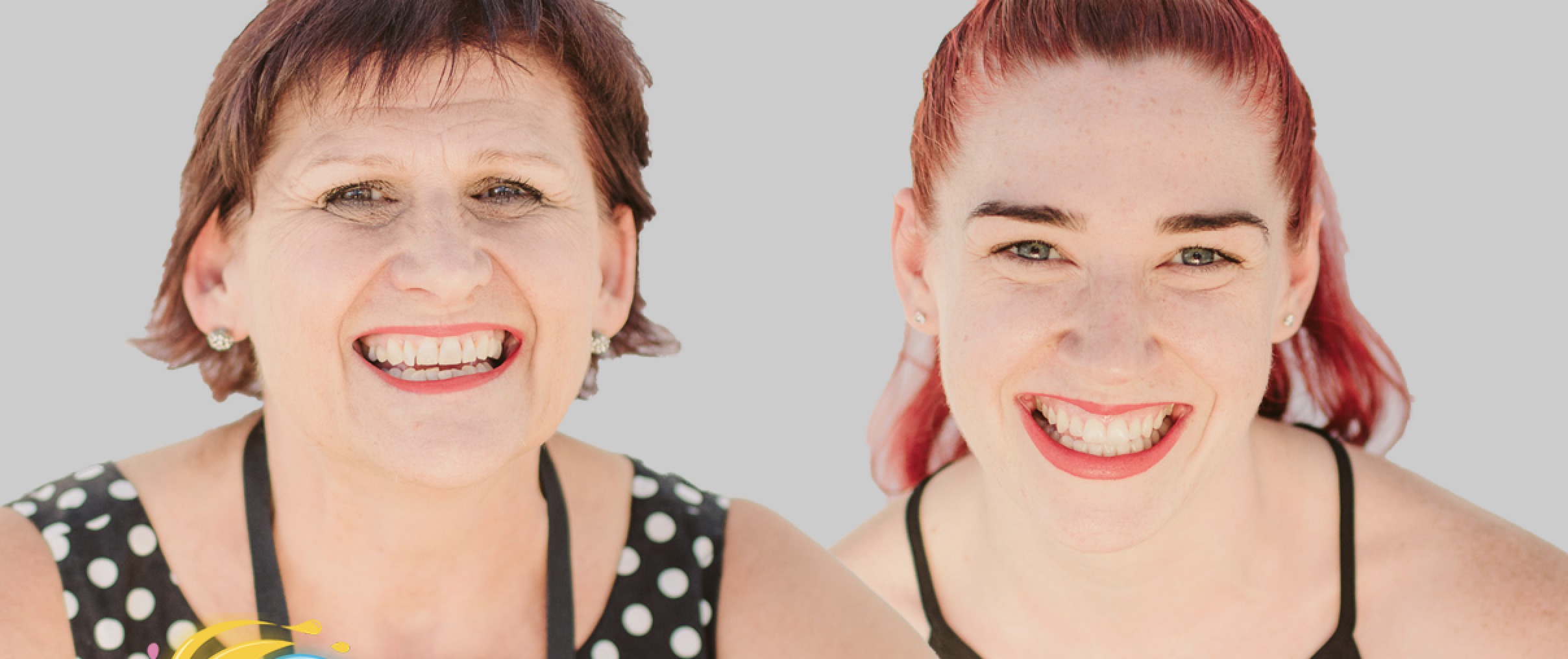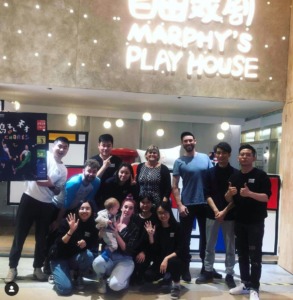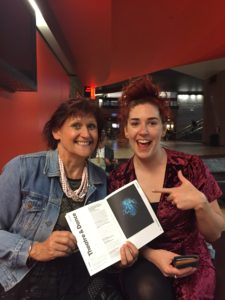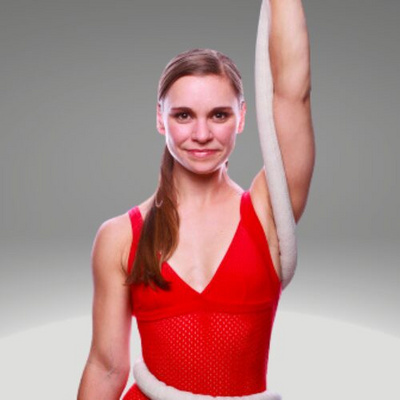Cluster Arts: Brisbane’s Circus Management Team Backstage and Taking Care of Business

Transcribing my conversation with Deb Wilks (Executive Director) and Kate Malone (Executive Producer) of Cluster Arts was like time travel. We spoke in mid-March. The company was celebrating its 5th anniversary, and Covid-19 had yet to truly, globally impact the performing arts. I listened to our past selves describe future plans that now we know will not take place. Despite the time warp, this interview expresses something far more permanent: Cluster Arts’ core values of support and love for the artists they represent, Australian communities and audiences, and the art form of circus. The Brisbane based management team helps artists and companies become sustainable organizations from the ground up as well as propelling already established enterprises into new possibilities. The company handles everything from keeping promotional photos organized to the copious details involved with international touring. They represent companies such as Casus Circus, Company 2 and Briefs. I remember thinking as we ended the conversation, if I needed a management team, it would be Cluster Arts.
Madeline Hoak: After looking at the Cluster Arts’ website, I have to ask, what don’t you do?
Deb Wilks: (with a laugh) We don’t perform!
Kate Malone: We love management.
MH: Cluster Arts provides ‘backend’ services. Tell me more about that.
In Australia, generally, you’re a not-for-profit. We’re going the opposite direction and making [companies] a proprietary limited company, that is a for-profit model. They should be proudly seeking to make money. Let’s get away from this idea of not earning money or being poor.
DW: It’s the stuff behind the scenes that nobody sees: the budget, the booking, the insurances, the contracts, the visas. All the stuff that has to happen before anyone does anything, really… [artists] wear many hats, and sometimes the business side of it gets left behind… We’ve worked with circus and physical artists for a long time and watched how they operate… It’s taken a little while, for circus artists especially, to understand — or appreciate — that they need these services. If a band starts up, the first thing they do when they have a hit record is get a manager. Circus artists don’t do that. They manage themselves. They do their own photography, they do their own video, they do their own everything. The thought of letting go of that stuff is terrifying for some of them, I think.
KM: The biggest thing that we’ve had to develop over the years is the artist’s trust. It’s their baby, their work, and to hand that over to someone else can be really scary… They need to know that the person they’re handing it over to will treat it with as much respect and love as they would. Which we really pride ourselves on, that we care so much about the artists.
MH: How do you develop that trust with an artist?
DW: I think authenticity and honesty. It’s an interesting question because you can’t make it happen, can you? You can’t force someone to trust you… We spend a lot of time with the artists. We try to see them on tour as much as we can… It’s being in constant communication, and always keeping them up to date with everything that we’re doing. It’s not that they don’t know what the budget is, or don’t know what the contracts say. They have access to everything we do.
KM: People want to work with us because of our values, rather than going, yes, they can do a budget. That’s really important to us.
MH: The media on the Cluster Arts website is great. How do you help artists get superb digital materials?

KM: I think Chores is a good example. On our website we have a Chores case study. We’ve known Julian [Roberts] for a very long time. He came to us after getting six months of work canceled… They had some very basic photos, you know, taken in a backyard. The show was incredible, but he just needed help packaging it in a way to sell it to festivals and venues. So that’s where we came in. We got a professional photographer. Julian directed the shoot, but we were thinking if it goes into a festival program, what does it need to look like? And then getting their copy and marketing materials together — in a way, they were starting from the start.
DW: We’ve got this one-page business plan that we ask artists to complete, which asks where their current reality is and where they want to be in year one, two, three… [With Chores] we achieved what we wanted to achieve just by sticking to the plan, and changing it when we needed to change it.
KM: So many artists will do the fringe circuit — Adelaide, Edinburgh — but not do all the planning, the strategizing to make sure the right presenters are seeing the work. They do these fringes, loose out on money, but don’t know what to do next because they haven’t sold the show in the way that it needs to be sold.
DW: It’s not just about getting the show on the road. We talk about what we do on the computer for them, but there is a lot of propping up, and hugs, and just love that needs to be given to the artists. Because not a lot of people do that!
DW: For them to know that they can call us at any hour, which they do!
ME: What is a keystone moment when an artist or a company needs management?
DW: Each company is different, but it’s the touring. That’s where they earn their money. If we can not do a fringe [festival], that’s better. It’s better to be in a paying gig… We believe, if we can get them on the road enough, then they become financially sustainable and they’re not looking for funding… In Australia, generally, you’re a not-for-profit. We’re going the opposite direction and making [companies] a proprietary limited company, that is a for-profit model. They should be proudly seeking to make money. Let’s get away from this idea of not earning money or being poor… Casus [Circus], for example, have been touring for the last five year non-stop without funding. It’s a fully self-sustaining model that they’ve got… Once a company discovers that touring is what they want to do, that that can become a sustainable model for them… And I’m not saying it’s easy! It’s not, but no business is easy. That’s the other thing we say to artists: it’s not actually meant to be easy.

KM: And understanding the markets and going, ok, right now in Australia you’re not going to earn a lot of money out of touring. Companies are earning a lot more overseas, so we need to think of the next few years. Is Brexit going to effect touring in the UK? With the coronavirus we’ve have a few tours in China [canceled]. Even Edinburgh, is that going to be on? We’ve just got to be really on the ball with working out what to do if something like that happens.
ME: You really have to be tuned in to the global financial and political scenes, don’t you?
DW: There’s an Australia government initiative called the Export Market Development Grant that covers 50% of your costs when you market your products overseas. It’s used by any company, but artists don’t think of it as marketing themselves when they go to the Edinburgh Fringe.
KM: Or as exports. They are exporting a good.
DW: So we’ve done a lot of work with the overseas markets, and are setting ourselves up as leaders in the Australian market as well. That’s something we’re really happy about.
KM: It means that a company could go to Edinburgh knowing that they are going to get 50% of that money back…It sets them up a bit more confident to spend a bit more on marketing, getting a publicist, advertising, and promotions… That means that your ticket sales are going to be better. It’s been really fantastic for the companies… Even a very simple thing as currency. Whenever a tour is going overseas, we work with a company and lock in the currency for the tour, there’s no transfer fee, international bank fees. It’s $150 here and there, but it adds up if you’re doing so much touring.

MH: What is the three-year plan for a company, like Briefs, that is already internationally established?
DW: To get a new show up and running, and to reimagine what they can do with a new team.
KM: There’s a lot of markets they haven’t gone into, so starting to explore the greater USA market or South America… And also going back to community. We want to do an Australian regional tour going into remote towns doing a Club Briefs pop-up night, whether the venue is a community hall, a basketball court, whatever… Really giving back to the community, and just having fun with those audiences.
DW: There’s a lot of opportunity for them. They’re just scratching the surface, I reckon.
ME: You are such a support system. Who supports you?
DW: That’s a very good question!
KM: We have a really lovely little Cluster group here. We all support each other.
DW: Our dogs!
KM: We’ve got a really great workplace. We’ve got a very open office that we can talk candidly about things. We work really, really hard, but we wouldn’t do it if we didn’t love it… We’re big thinkers and we are big dreamers.
MH: Yes, but you also get it done!
DW: That’s true. That’s another thing: people suss out if you’re just a talker. You say you’ll do this, and you don’t. You’ve got to follow through, haven’t you?
MH: So what’s next for Cluster Arts?
KM: Cluster Arts has been doing a lot of advocacy around Brisbane, which is the second-largest circus hub in the world outside of Montreal, and yet a very small percentage of Brisbane audiences know that we’re here. Last year, Cluster Arts became a cultural organization of Brisbane City Council. We’ve been funded for the next few years to keep putting on performances, workshops and showcasing the talent here and making it a point of difference for Brisbane… We’ve got plans to have an international circus festival here in the next few years. That’s a big, big thing that we’re in the starting stages of planning.
MH: What’s your favorite part of the job, the pinnacle moment after all the hard work?
DW: For me, recently, it was when I wrote to Julian after Edinburgh… I did the finalized budget, and I said, ‘I’m just depositing this much money in your bank account today.’ He came back straight away and said, ‘I can’t stop smiling, I just couldn’t do this without you, thank you so much!’ (To Kate) It was just lovely, wasn’t it? That’s what it’s all about: to see the artist get that feeling of success, and that their work is really valuable.
A note from Cluster Arts: Since this interview, all touring work has been cancelled! What looked like an amazing year will still be amazing but for different reasons! We are supporting artists to write many funding applications to try to keep them going until international travel restrictions are lifted and we can begin to tour again. We are also focused on finding other income streams outside the traditional arts over the next twelve months. We believe we will return to stages and that audiences will return to theatres. We must keep going until then!
Featured photo by Kate Pardy.
Editor's Note: At StageLync, an international platform for the performing arts, we celebrate the diversity of our writers' backgrounds. We recognize and support their choice to use either American or British English in their articles, respecting their individual preferences and origins. This policy allows us to embrace a wide range of linguistic expressions, enriching our content and reflecting the global nature of our community.
🎧 Join us on the StageLync Podcast for inspiring stories from the world of performing arts! Tune in to hear from the creative minds who bring magic to life, both onstage and behind the scenes. 🎙️ 👉 Listen now!
